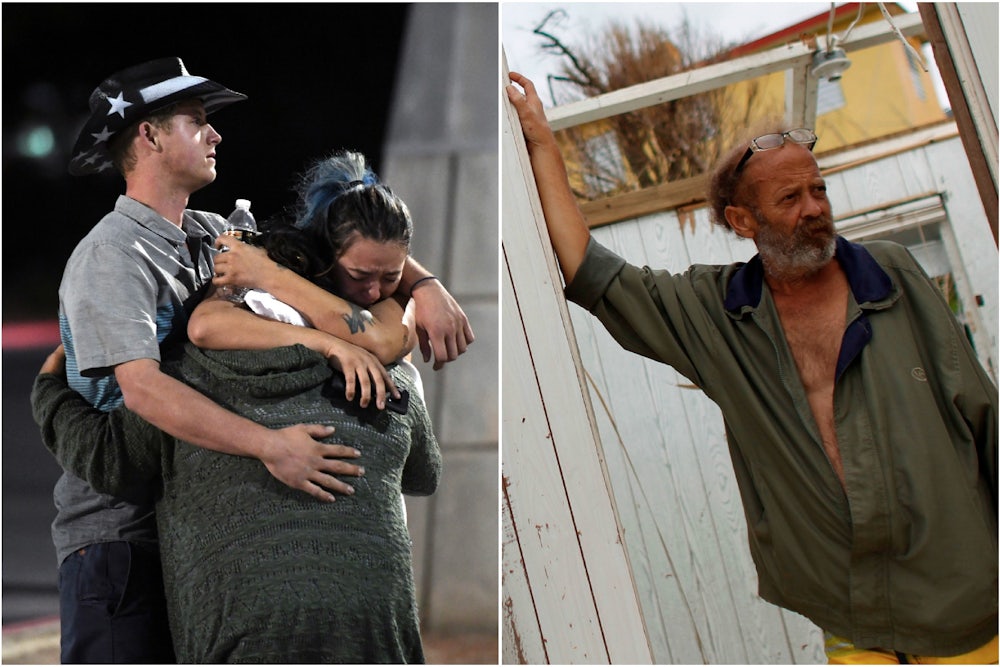On Monday, President Trump strode to a podium and delivered prepared remarks about an American tragedy. He said the federal government is working closely with local officials, and promised updates as the situation developed. He praised the professionalism and courage of first responders whose “miraculous speed” saved lives. He expressed sympathy for everyone suffering through “this very dark period.” He announced plans to visit the devastated community. Then he said a prayer for the victims, and encouraged Americans to unify in the face of such “terrible” and “senseless” destruction.
Trump was referring to Sunday night’s mass shooting in Las Vegas, which left at least 59 dead, but similar sentiments could have been delivered after Hurricane Harvey hit Houston, or Irma hit Florida, or Maria hit Puerto Rico. The sameness of the political and media reaction in the face of extreme weather and gun violence is part of a disaster blueprint, where expressions of “horror” are followed by paint-by-numbers statements of “thoughts and prayers.” We have fashioned a script for tragedy and dutifully read from it, regardless of what that tragedy looks like.
The resistance to “politicizing” disaster is also written into the script. It is “insensitive to the people of Florida” to discuss how climate change has made hurricanes more extreme, EPA Administrator Scott Pruitt said after Irma. Asked about gun control on Monday, White House press secretary Sarah Huckabee Sanders said that “there will certainly be a time for that policy discussion to take place, but that’s not the place that we’re in at this moment.” It is never the right time for uncomfortable discussions that divert from the tragedy narrative.
Instead, any attempt to explore the root causes of these disasters leads inevitably to a sui generis rendering. Stephen Paddock, the Las Vegas killer, was a “lone wolf” gunman; the back-to-back-to-back Category 5 hurricanes were “perfect storms.” Houston has had three “500-year” floods in the past three years, and there have been 273 mass shootings in the first 275 days of 2017. But these are unusual acts of God, impossible-to-stop phenomena that we can only absorb and endure.
Thus, we will provide disaster assistance and (eventually) aid to Puerto Rico, but will not address the human-caused global warming that fuels these extreme storms. We will summon all levels of law enforcement to hunt down and kill or capture a mass shooter, but we will not make any law about the instrument of his destruction. Root causes are pushed aside; myopia rules the day. The tragedy script exists in a vacuum.
Public opinion does not bend to this dominant narrative. Support for gun safety laws like universal background checks represents one of the few overwhelmingly unifying poll questions in American politics, and majorities agree with the idea that climate change has made extreme weather more dangerous. None of this matters; there’s a script and everyone in American political life must stick to it. The gun lobby and the oil lobby demand nothing less.
Indeed, even after the nightmare in Las Vegas, the GOP-controlled House this week plans to pass the Sportsman’s Heritage and Recreational Enhancement Act, which would eliminate the taxing and licensing of silencers, making them no more difficult to purchase than a firearm. (A hearing on the bill was originally scheduled for the day that a gunman opened fire on a congressional baseball practice, wounding Representative Steve Scalise and three others.) Even after the worst hurricane season in recent memory, the Senate readied a budget resolution that would allow for expanded oil drilling in the Arctic National Wildlife Refuge with simple a majority vote.
Even if you disagree with my analogy—if you think that gun safety regulation would clearly prevent the worst mass shooting events, while climate laws wouldn’t stop the extreme weather already propelled into motion by carbon pollution—you cannot deny the tyranny of the script. Our politicians mourn, our media serves the familiar narratives, and we end the day in the same place where we started it, bewildered by reducible catastrophes but unwilling to do anything about it.
Democrats have been more willing to throw aside the script when it comes to guns. Last year, they held a sit-in on the House floor to demand a vote on a particular gun safety legislative package; and on Monday, several prominent Democrats called for stricter gun control. They’ve shown less courage when it comes to climate; barely any Democrat cited a warming planet as a major culprit in the parade of extreme September storms. “We have a lot of time to make that point,” Senator Sheldon Whitehouse, a Democrat from Rhode Island, told Politico.
Nobody who’s been following the news over the past decade believes that politics will lead to anything but posturing in the wake of tragedy. We have narrowed and hermetically sealed the range of acceptable responses to shootings and storms, these made-for-TV events that have been unofficially determined as something we all must live with, something that politics has no capacity to impact. And when the tragedy script plays out, many of us feel a profound powerlessness; every time a new disaster strikes, fewer of us speak up. This has become the most damning case of political correctness in American life.
